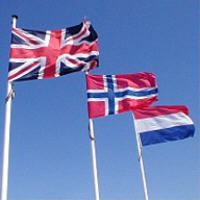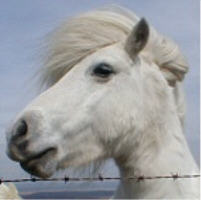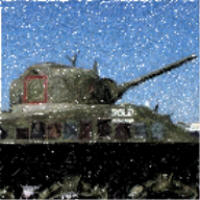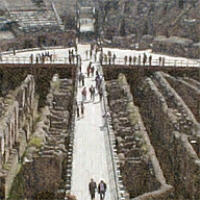|
The Olympics
Pagan History
In 776 BC the first Olympic Games were held in Greece. For over one thousand years
the Games, the most prestigious in the ancient world, were held in Olympia, part of
the Peloponnesian region in Greece and history has intertwined mythology with fact.
The athletes from everyday walks of life enjoyed prominent status as most Greeks had
grown up listening to legends of the half mortal, half divine Greek gods. The ancient
games were funeral games – racing and wrestling events that honoured the dead.
The Games allowed for a physical release of grief while reinforcing the struggle and
triumphs of life. At the beginning of the Games an oxen would be slaughtered on the
altar of Zeus. Due to strict rules the only competitors allowed were free Greeks
(no slaves allowed) who had no criminal record.
|
|

|
This led to athletes who had the backing of a rich sponsor competing, but also the working
man was able to give it his best, especially in the more vigorous sports of wrestling,
boxing and tests of strength. One month before the Games began the athletes were placed
on a vegetarian diet (though fish was allowed).
Women and the Olympics
Married women were banned from the games but the unmarried flocked to the arena to see the
elite bodies and to ogle the super heroes of their day. At one stage all women were banned
from watching the Olympics Games in ancient Greece because the male athletes wore no clothes.
An ancient story circulated that the tradition of nudity began in 720 BC when an eager sprinter
lost his shorts whilst competing yet won the race, so from that point on it was deemed advantageous
to run clothe-less.
|
 |
|
Horses and Chariot Races
Greek Jockeys were considered mere employees who rode bare back. When a race was won, the owner,
and not the rider, was crowned with the olive wreath. According to some accounts, married
ladies who owned race horses could be a spectator as the olive wreath had to be placed upon
their heads if their horse won.
In 67 AD Emperor Nero staged a unique ten-horse chariot race in which he participated, but was
unable to complete the course as he fell from his chariot. The biased (and probably scared) or
‘bought’ judges ascribed him as the winner but later historians removed Nero’s name from the
list of champions and hall of fame.
The four horse chariot race was very popular with the crowds and is immortalised in the
classic film, ‘Ben Hur’ who was played by Charlton Heston. Heston also played Moses
in the biblical epic ‘The Ten Commandments.’
|
The Apostle Paul at the Olympics
The apostle Paul, missionary and writer of most of the New Testament knew all about the Olympics,
what it entailed and the training that the athletes endured. Paul had visited Athens on at least
one occasion in around 50 AD-54 AD (1 Thessalonians 3:1 and Acts 17:16) and was distressed to
see that the city was given over to idols, so he preached in the market places and he reasoned
in the Synagogues with the Jewish and Gentile worshipers.
Certain Epicurean and Stoic philosophers encountered Paul and accused him of being a babbler
because he preached about Jesus Christ and the resurrection from the dead which was all
new to them. Others who were interested took him to the Areopagus on Mars Hill as the Athenians
and the foreigners enjoyed talking about new doctrines and new ideas.
Paul preached to the crowds and pointed out that they had an inscription on an altar
TO THE UNKNOWN GOD. Paul told those assembled that he knew this God and that He was
not far from each one of us. He proclaimed that the people must repent and worship the
one true God, the giver of life and stated that ignorance was no excuse. Some mocked,
others wanted to hear him again and some believed (Acts 17:16-34).
The apostle Paul in several sentences of the Holy Bible spoke in Olympian terminology with
both the runners and the boxers in mind. He knew that to be the best and to come forth
victoriously then hard training and discipline was needed.
‘Do you not know that those who run in a race all run, but one receives the prize? Run
in such a way that you may obtain it, a perishable crown…Therefore I run thus, not with uncertainty.
Thus I fight: not as one who beats the air. But I discipline my body…lest…I myself should
become disqualified’ 1 Corinthians 9:24-27.
‘I have fought the good fight; I have finished the race…’ 2 Timothy 4:7.
Also, the writer to the Hebrews wrote: ‘Let us run with endurance the race that is set before us’
Hebrews 12:1.
Stop and Start
The Games were stopped in 392 AD on the orders of a Christian Roman Emperor who was concerned about
its Pagan history and its dedication to the pagan gods. In the 19th century, English schools began
to revive the Ancient Greek ideal of combining academic and physical education.
In the 1880s a French aristocrat was so impressed with the English education as he saw the
decline within his own country, that he was encouraged to pursue his life’s ambition of reawakening
the Olympic Games worldwide to promote sporting amateurism and fair play.
The Games were not restarted until 1896 after a gap of 1,500 years when they took place in Athens.
The 1896 Games nearly never happened due to Greek political instability; and the cost delayed proceedings,
until a wealthy donor stepped in.
In 2004 three months before the Olympic Games were to take place in Athens, there was a rising concern
whether or not Greece would be able to complete all its building work in time and contractors
were put on 24 hours shifts. Australia (who hosted the Sydney Olympics in 2000) raised its
concerns and told the world that if need be they would be able to host the event. In the end,
Athens was able to host the prestigious event even though some designs of the architects’ plans
were not able to be incorporated due to time constraint – such as the swimming pool roof!
|
 |
|
The World Wars
The Games were stopped during the First World War (1914-1918).
In 1936 the 11th Olympic Games, opened in Berlin. Adolf Hitler’s attempts to prove Aryan superiority at the
Berlin Olympics were seriously dented (praise the Lord) by the great African American athlete Jessie Owens,
who won gold medals in the long jump, the one hundred metres and the two hundred metres.
Hitler left the stadium early as he refused to present Jessie with his gold medals.
In 1948 the Olympic Games were held for the first time after World War Two (1939-1945)
and were hosted by London, England.
|
Terrorists and the Olympics
On the 5th September 1972 at the Munich Olympic Games in Germany, eight Palestinian terrorists held
to ransom eleven Israeli athletes. They demanded that Israel release two hundred Arab prisoners
and that they be given safe passage out of Germany.
Later that night and into the early hours of the next morning all the athletes were massacred
as the terrorists tried to leave the country with their hostages. Five of the terrorists were
killed along with one policeman, and three were captured. But the murder of eleven Israeli
athletes was not considered sufficiently serious to merit cancelling or postponing the Olympics.
On the 29th October 1972, a Lufthansa plane (German) was hijacked by terrorists demanding
that the Munich killers be released. The Germans capitulated and the terrorists were let go,
but an Israeli assassination squad was assigned to track them down along with those responsible
for planning the massacre.
Eight of the eleven men targeted for death were killed; of the remaining three, one died of
natural causes and the other two were assassinated but not by Israelis. The self-professed
mastermind behind the hideous crime is still in hiding, allegedly somewhere in Africa.
In 2004 Israeli, American and British teams had a larger proportion of security assigned to
their athletes. The Israelis for being Jews and the two allies for their participation in the
Iraq war from March 2003 onwards and the general anti-Western sentiments from the terrorist
group al-Qaeda.
Olympic Sporting Events
In 1984 Olympic British ice skaters Torvill and Dean skated ‘Bolero’ and received all perfect
scores for quality and won the gold medal. The most individual gold medals won at the Olympic
Games was seven, won by Mark Spitz of America in 1972.
Britain’s Sir Steve Redgrave’s ‘Athlete of the Century’ as known in the rowing world, won five
gold medals at four consecutive Olympic Games, 1988, 1992, 1996 and 2000 making this feat a
world record in the Games history.
Only a few countries have been represented at every single Games since 1896. They are Greece,
Great Britain, France, Australia and Switzerland.
In 2004 in Athens, two hundred and two countries competed which was a record in itself and every
country had one of the colours from the five Olympic rings incorporated into its flag.
In 2004 a news commentator noted that ‘Iraqi athletes no longer fear reprisals for not winning’
as Iraq’s former Dictator Saddam Hussein was ousted from power the year before.
Beijing Olympics 2008
In 2008 the Games were held in Beijing, China; but when Beijing won the nomination in 2001 to
host the 2008 Olympics there was much controversy due to their poor human rights record.
At the time supporters for China's nomination said that China had made improvements in this
area and hopefully this token sign of friendship would continually improve the situation for
the nationals.
For many years there has been talk of mass demonstrations in front of the world’s media concerning
human rights violations especially in regards to the treatment of North Koreans who cross
the Chinese / North Korea border trying to flee to safety. If they are
caught they will face immediate deportation and certain torture and death in North Korea
and punishment is handed out upon on all citizens who try to assist them.
For many in China, these Olympic games were a 'coming-out' celebration for the nation, to show that
China is now among the 'great powers' of the world. Much of China's population still lives in
great poverty, but because of the massive economic growth, millions have been given a new
chance in life.
Olympics Facts
In 1976 Olympic testing of athletes for anabolic steroids began.
In August 1984, South African runner Zola Budd accidentally tripped up American champion Mary Decker while running the
three thousand metres in the Los Angeles Olympics, causing one of the most dramatic sporting upsets ever.
In 1988 pole vault champion, Jeff Gutteridge became the first British athlete to be banned for life for taking anabolic
steroids.
In 1996 a pipe bomb exploded at the Centennial Olympic Park in Atlanta, Georgia, America during the Olympic Games.
One person was killed and one hundred were injured.
In 2004 the 28th Olympics in Athens, Greece opening ceremony was watched by a possible four billion people.
In 2004 the security cost estimates calculated a figure as high as £1.3billion! The total cost to host the Olympics
was estimated at between £4-5 billion and it will take up to twenty years for Greece to recuperate its money in tourism etc.
To host the 2008 Beijing Olympics, a reported 250,000 Chinese homes were demolished. Several years prior to the
games taxi drivers in Beijing had to begin to learn English. Also, since 2007, the Beijing population has had special
‘queuing days’ when its citizens learn to get in line and queue.
|
Athletic Scriptures from the Holy Bible
‘Therefore we also, since we are surrounded by so great a crowd a cloud of witnesses, let us lay
aside every weight, and the sin which so easily ensnares us, and let us run with endurance the race
that is set before us, looking unto Jesus, the author and finisher of our faith who for the joy
that was set before Him endured the cross…’ Hebrews 12:1-2.
‘For you have need of endurance so that after you have done the will of God, you may receive
the promise’ Hebrews 10:36.
|

|
|
‘Do you not know that those who run in a race all run, but one receives the prize? Run
in such a way that you may obtain it. And everyone who competes for the prize is
temperate in all things. Now they do it to obtain a perishable crown, but we for an
imperishable crown. Therefore I run thus: not with uncertainty. Thus I fight: not as
one who beats the air. But I discipline my body and bring it into subjection, lest,
when I have preached to others, I myself should become disqualified’ 1 Corinthians 9:24-27.
‘I have fought the good fight, I have finished the race, I have kept the faith’ 2 Timothy 4:7.
|
Australian Olympic Questions from 2000
The following are some of the humorous questions that were asked of
the Sydney Olympic Committee via their website and their witty replies.
1. (Sweden) I want to walk from Perth to Sydney can I follow the railroad tracks?
Answer: Sure, it’s only
three
thousand miles, so you’ll need to have started about a year ago to get there in time for this October...
2. (Germany) are there supermarkets in Sydney and is milk available all year round?
Answer: No only
on Tuesdays.
3. (USA) Will I be able to speak English most places I go?
Answer: Yes, but you'll have to learn it first.
4. (Sweden) Is it safe to run around in the bushes in Australia?
Answer: And accomplish what?
5. (UK) Does it ever get windy in Australia? I have never seen it rain on TV, so how do the plants grow?
Answer: Upwards, out of the ground,
like the person who asked this question, who themselves will need watering if their IQ drops any lower...
6. (Germany) Do tents exist in Australia?
Answer: Yes, but only in sporting supply stores, peoples’ garages,
and most national parks...
7. (Germany) Can I drive to the Great Barrier Reef?
Answer: Sure, if your vehicle is amphibious.
8. (UK) Can I bring cutlery into Australia?
Answer: Why bother? Use your fingers like the rest of us...
9. (France) Do you celebrate Christmas in Australia?
Answer: Yes, at Christmas.
10. (Germany) Are their killer bees in Australia?
Answer: Not yet, but we’ll see what we can do when you
get here.
11. (USA) Please send a list of all doctors in Australia who can dispense rattlesnake serum.
Answer: There
are no rattlesnakes in Australia.
12. (USA) Which direction is North in Australia? Answer: Face North and you should be about right.
|
|
|